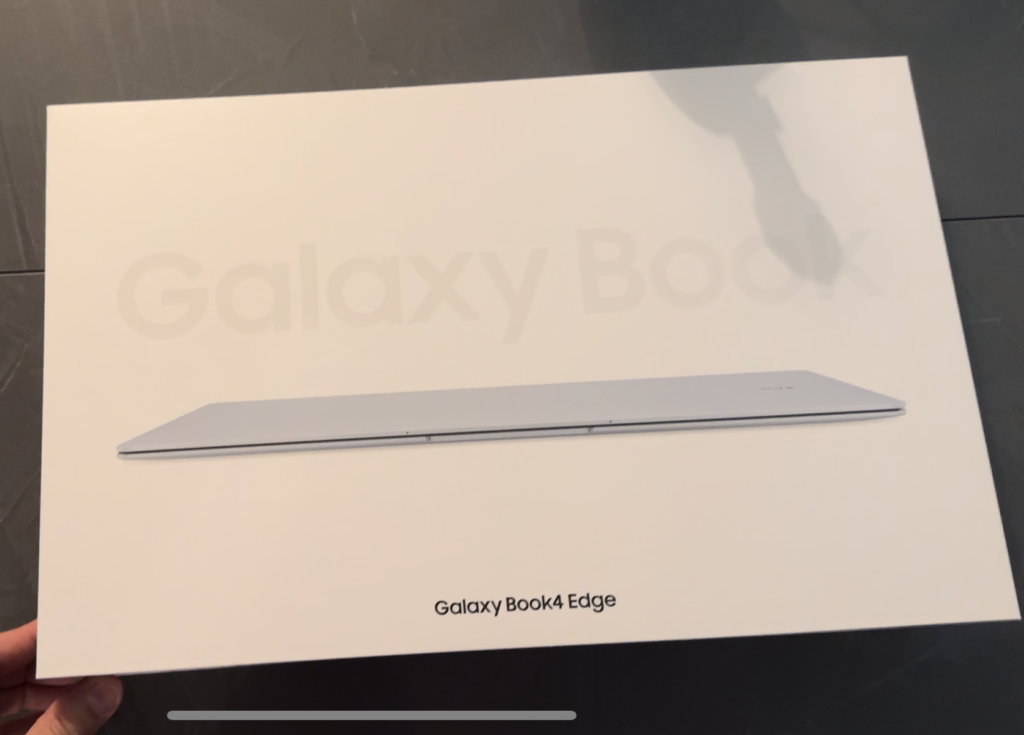Samsung’s Galaxy Book4 Edge was the first Copilot+ certified computer to hit the market; this is a new type of laptop which integrates not only a processor (CPU) and graphics card (GPU) but also a neural processing unit (npu), dedicated to advanced artificial intelligence computing. In theory, it is possible to use AI on these machines even without being connected to the Internet since their “brains” mostly work locally, not sending and receiving data over the network. We mentioned theory because there is no setting that lets the user decide what the AI can do, so for now, it is a gamble. Also, in terms of privacy, it is all to be won.
What it looks like
The Galaxy Book4 Edge is a premium product, starting with the construction materials. It is lightweight, with a large, bright screen and very small bezels. Not surprisingly, it is billed as a direct competitor to Apple’s top-of-the-line MacBooks. Without getting too deep into technicalities, we need to say a few words about the hardware we have on our hands.
Book4 Edge is the first of its kind to be powered by the Qualcomm Snapdragon X Elite Nput chip, which, as mentioned, works together with traditional components, CPU and GPU. According to Samsung, the Snapdragon X Elite is the world’s fastest and most efficient processor. This means that the device can offer AI processing 4 times faster than a competitor, such as the Adreno Graphics, and handle Wi-Fi 7 connectivity smoothly. For Samsung, the chip beats Apple’s MacBook Pro M3 and also an Intel Core Ultra 7, two of the best computer processors around. The remaining specs include two USB 4.0 ports with Thunderbolt 3, one USB 3.2, one HDMI 2.1, a MicroSD reader and mini-jack input, Wi-Fi 7 and Bluetooth 5.4 connectivity, 1080p webcam, stereo speaker and Windows Hello fingerprint reader.
A world of AI
The npu, along with Microsoft Copilot and Galaxy AI, works continuously in the background, both to optimize presentations and to respond quickly to user requests. Samsung’s and Microsoft’s new Surfaces are among the first examples of integrating a dedicated Copilot button. First, you must install the app from the Microsoft Store; otherwise, pressing the button in the lower right corner simply opens the Windows 11 summary menu. Once Copilot is loaded on the computer instead, the keyboard shortcut will speed up the feedback with the chatbot to ask everything from summarizing documents to creating graphics. Nothing new compared to the AI seen months ago now, but the Snapdragon makes every single task much faster than what we have seen so far.

Galaxy Book4 Edge
In any case, Copilot works everywhere, helping in all your application suites. It has the capabilities to intelligently adapt to your workflow, from writing emails, generating images, answering questions, adding content to existing documents, summarizing and transcribing text, and editing writing to make it more concise. But the real selling point is the combination with Galaxy AI, which we learned about aboard the Galaxy S24. Just one example out of all: by wirelessly connecting your Samsung smartphone or tablet to the Pc, you can take advantage of options such as “circle and search” on the larger screen, but also the translation of a note and a phone call in real-time. Detractors may argue that this is simply phone-to-computer mirroring, but running it between two items of the same brand makes all the difference, somewhat like what happens in the Apple ecosystem.
The Recall feature, known as Recall, which allows the computer to record everything a user does on the display for later recall via text prompts to the AI, is not yet active. Some privacy snags first prompted Microsoft to make Recall an option to be enabled later and then tout-court postpone the launch in Europe. However, many other opportunities remain to take advantage of artificial intelligence, including chat assistance, note assistance, transcription assistance, interpreter, real-time translation, photo assistance, and the aforementioned “circle and search.”
Galaxy Book Experience
To simplify the discovery of what the Copilot+ handset can do, Samsung has created a small hub called Galaxy Book Experience that summarizes all the major features of the brand’s apps. Some are well-known, such as Samsung Notes, and others are less well-known. Such is the case with Samsung Studio, the Korean company’s answer to Apple’s iMovie, with the ability to edit content even from smartphones and tablets and then synchronize it in the Pc editor. Two notebook versions are available: Samsung Galaxy Book 4 Edge with a 14-inch or 16-inch screen.
Both panels are touch and have 3k resolution, as well as Gorilla Glass Dx anti-reflective protective glass. The list price is not low but could not be otherwise, given the array of technologies offered. The starting price tag reads 1,699 euros for the 14-inch with 16 GB of RAM and 512 GB of storage, going up to 1,799 euros for the 16-inch model and 16/512 GB, and a maximum of 2,099 euros for the 16-inch variant but with 16 GB of ram and 1 TB of storage.
Is it worth it?
Considering the expense, the question is whether it is worth the return. The promises of AI are many, but so far, little has materialized into truly useful products for the masses. The Galaxy S24 was first, and the Galaxy Book4 Edge is now among them. The handset we tested is fast, responsive, beautiful to look at and use, and has virtually no usage limitations, with the benefit of solid interoperability between Copilot and Galaxy AI. It is a practically must-have choice for those using a Samsung phone, given the opportunity for the two to talk to each other without cables. Achieving Apple’s maturity requires a few more baby steps. However, it is more about the operating system than the work of manufacturers like Samsung, which shows that it is trying hard to bring consumers into the new era of AI PCs.


